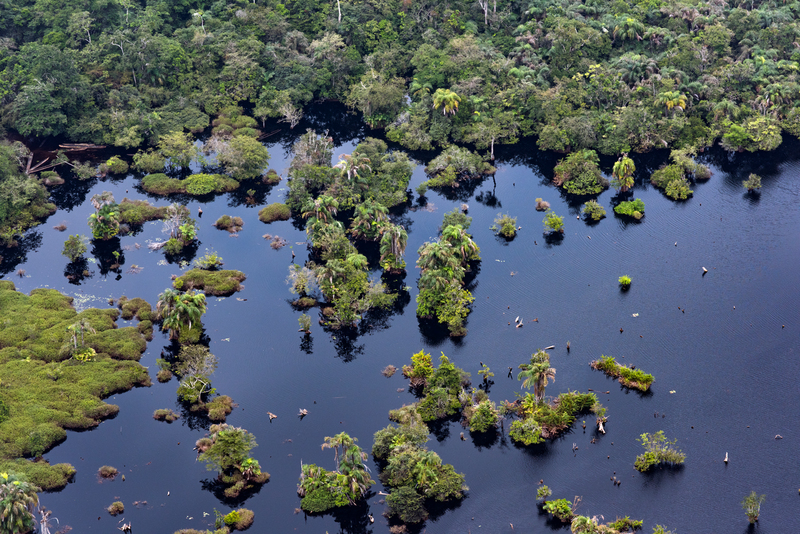The Democratic Republic of Congo (DRC) went ahead on Thursday with actioning off tracts of land to international oil companies despite promises to UN and the EU to protect the rainforest in the fight against climate change.
A previously reported, the auction covers 27 oil and three gas fields and encompasses an area more than 240,000 km2, including rainforest and peatlands that is storing vast amounts of carbon. The drilling fields are close to or inside protected areas, including a gorilla sanctuary.
Three of the oil fields are located on the verge of the Congo River basin and nine in the “central basin” rainforest region in the west of the country. The other 15 are in the east of the country, near the Albert and Tanganyika great lakes.
The launch of the bidding process was presided by President Felix Tshisekedi at a ceremony in the capital Kinshasa. He told media that the launch speaks to his country’s desire to put its resource potential to the service of the country and boost its development. The president denied that DRC was going back on commitments to protect its forests.
A European Commission official told The Brussels Times on Friday that the Commission is closely following the developments relating to the auction and sees it as a worrying step. The scope and framework of the auction is yet to be communicated but it appears that some of the oil blocks may be located in protected areas, including peatlands, which would be a source of concern for the EU.
DRC has signed what was described a landmark agreement last November at the UN Climate Change Conference (COP26) in Glasgow – the Central African Forest Initiative. It comes with a UN trust fund of $500 million over the first five years and is supported by among others the EU and some of its member states.
The Commission noted that the announcement of the auction of environmentally detrimental oil blocks is very unfortunate as the country is due to host the PRECOP27 in September and October. In the framework of its periodic political dialogue, the Commission will engage with the government on this issue to increase its understanding of the impact of the auction and share the EU’s concerns.
The PRECOP27 events in DRC take place before the UN climate change conference (COP27) in November in Sharm El-Sheikh in Egypt.
Can the proposed revision of the directive on Environmental Crime be applied in this situation?
The Commission proposed last December a new directive on the protection of the environment through criminal law. The proposal set outs minimum rules for defining environmental crimes, which are the most severe breaches of EU environmental law, and the level of sanctions for these offences. However, the proposal outlaws only those activities which are illegal in the EU, the official confirmed.
Moreover, application of criminal laws is determined by jurisdictional rules that set which courts can take up cases. In the absence of a sufficient ground for jurisdiction, cases may not be prosecuted in the EU. This proposal is currently negotiated by the European co-legislators – the European Parliament and the Council.
Today the most significant driver of deforestation is legal land use conversion according to the laws of the country where deforestation takes place, e.g. for agricultural use or other exploitation, such as for fossil fuels or raw materials, the Commission explains.
Therefore, among other actions, to tackle deforestation, the Commission proposed a new Regulation on Deforestation Free Supply chains, which is also being negotiated by the co-legislators and which will, upon entry into force, replace the EU Timber Regulation.
This regulation would set mandatory due diligence rules for operators which place specific commodities on the EU market or export from it that are associated with deforestation and forest degradation – soy, beef, palm oil, wood, cocoa and coffee and some derived products. The list does not include fossil fuels.
However, criminal law can only be one of many necessary tools to halt deforestation and forest degradation, according to the Commission. Many other instruments, including engagement with the private sector for ensuring transparent and deforestation free supply chains, development support and policy dialogue with both consumer and producer countries are also essential.
Until now, the European Commission has been hesitant to support the campaign for the recognition of ecocide as an international crime. Will the Commission reconsider its position?
Although ecocide is not specifically included in the list of offences under the proposal for a new Environmental Crime Directive, the proposal provides an aggravating circumstance when an environmental crime causes substantial and irreversible or long-lasting damage to an entire ecosystem, the Commission explained.
“We are aware of the ongoing work for the recognition of ecocide as an international crime by the International Criminal Court, as well as of its recognition in several countries. We will take note of the results of this work as well as of the legal research on the ecocide concept. The question is still open at this stage as to the ways and means by which to factor in any new relevant information.”
M. Apelblat
The Brussels Times

